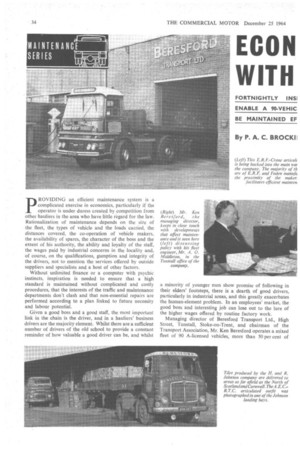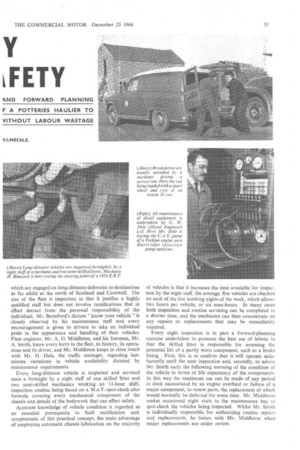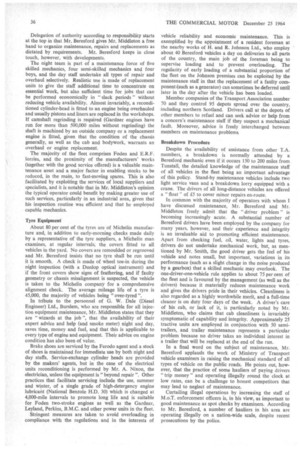ECON WITH iFEnf
Page 36

Page 37

Page 38

If you've noticed an error in this article please click here to report it so we can fix it.
FORTNIGHTLY INSI e■ ND FORWARD PLANNING ENABLE A 90-VEHIC F A POTTERIES HAULIER TO BE MAINTAINED EF VITHOUT LABOUR WASTAGE
By P. A. C. BROCKII
4.1.MECH.E.
pROVIDING an efficient maintenance system is a complicated exercise in economics, particularly if the operator is under duress created by competition from other hauliers in the area who have little regard for the law. Rationalization of maintenance depends on the size of the fleet, the types of vehicle and the loads carried, the distances covered, the co-operation of vehicle makers, the availability of spares, the character of the boss and the extent of his authority, the ability and loyalty of the staff, the wages paid by industrial concerns in the locality and, of course, on the qualifications, gumption and integrity of the drivers, not to mention the services offered by outside suppliers and specialists and a host of other factors.
Without unlimited finance or a computer with psychic instincts, inspiration is needed to ensure that a high standard is maintained without complicated and costly procedures, that the interests of the traffic and maintenance departments don't clash and that non-essential repairs are performed according to a plan linked to future necessity and labour potential.
Given a good boss and a good staff, the most important link in the chain is the driver, and in a hauliers' business drivers are the majority element. Whilst there are a sufficient number of drivers of the old school to provide a constant reminder of how valuable a good driver can be, and whilst a minority of younger men show promise of following in their elders' footsteps, there is a dearth of good drivers, particularly in industrial areas, and this greatly exacerbates the human-element problem. In an employees' market, the good boss and interesting job can lose out to the lure of the higher wages offered by routine factory work.
Managing director of Beresford Transport Ltd., High Street, Tunstall, Stoke-on-Trent, and chairman of the Transport Association, Mr. Ken Beresford operates a mixed fleet of 90 A-licensed vehicles, more than 50 per cent of which are engaged on long-distance deliveries to destinations as far afield as the north of Scotland and Cornwall. The size of the fleet is important in that it justifies a highly qualified staff but does not involve ramifications that in effect detract from the personal responsibility of the individual. Mr. Beresford's dictum "know your vehicle " is closely observed by his maintenance staff and every encouragement is given to drivers to take an individual pride in the appearance and handling of their vehicles. Fleet engineer, Mr. A. O. Middleton, and his foreman, Mr. A. Smith, know every lorry in the fleet, its history, its operations and its driver, and Mr. Middleton keeps in close touch with Mr. H. Dale, the traffic manager, regarding lastminute ..variations in vehicle availability dictated by maintenance requirements.
Every long-distance vehicle is inspected and serviced once a fortnight by a night staff of one skilled fitter and two semi-skilled mechanics working an 11-hour shift, inspection routine being based on a M.o.T.-spot-check-plus formula covering every mechanical component of the chassis and details of the bodywork that can affect safety.
Accurate knowledge of vehicle condition is regarded as an essential prerequisite to fault rectification and, symptomatic of this practical concept, the main advantage of employing automatic chassis lubrication on the majority of vehicles is that it increases the time available for inspection by the night staff. On average, five vehicles are checked on each of the five working nights of the week, which allows two hours per vehicle, or six man-hours. In many eases both inspection and routine servicing can be completed in a shorter time, and the mechanics can then concentrate on any repairs or replacements that may be immediately required.
Every night inspection is in part a forward-planning exercise undertaken to promote the best use of labour in that the skilled fitter is responsible for assessing the potential life of a partly worn component, such as a brake lining. First, this is to confirm that it will operate satisfactorily until the next inspection and, secondly, to advise Mr. Smith early the following morning of the condition of the vehicle in terms of life expectancy of the components. In this way the maximum use can be made of any period in dock necessitated by an engine overhaul or failure of a major component, to renew parts, the replacement of which would normally be deferred for some time. Mr. Middleton makes occasional night visits to the maintenance bay to spot-check the vehicles being inspected. Whilst Mr. Smith is individually responsible for authorizing routine repairs and replacements, he liaises with Mr. Middleton when major replacements are under review. Delegation of authority according to responsibility starts at the top in that Mr. Beresford gives Mr. Middleton a free hand to organize maintenance, repairs and replacements as dictated by requirements. Mr. Beresford keeps in close touch, however, with developments.
The night team is part of a maintenance force of five skilled mechanics, four semi-skilled mechanics and four boys, and the day staff undertake all types of repair and overhaul selectively. Realistic use is made of replacement units to give the staff additional time to concentrate on essential work, but also sufficient time for jobs that can be performed economically in "slack periods" without reducing vehicle availability. Almost invariably, a reconditioned cylinder-head is fitted to an engine being overhauled and usually pistons and liners are replaced in the workshops. If camshaft regrinding is required (Gardner engines have run for more than 500,000 miles without regrinding) the shaft is machined by an outside company or a replacement engine is fitted, given that the condition of the chassis generally, as well as the cab and bodywork, warrants an overhaul or engine replacement.
The majority of the fleet comprises Foden and E.R.F. lorries, and the proximity of the manufacturers' works (together with the good service offered) is a valuable maintenance asset and a major factor in enabling stocks to be reduced, in the main, to fast-moving spares. This is also facilitated by exploiting the services of local suppliers and specialists, and it is notable that in Mr. Middleton's opinion the typical operator could benefit by making greater use of such services, particularly in an industrial area, given that his inspection routine was efficient and that he employed capable mechanics.
Tyre Equipment About 80 per cent of the tyres are of Michelin manufacture and, in addition to early-morning checks made daily by a representative of the tyre suppliers, a Michelin man examines, at regular intervals, the covers fitted to all vehicles in the yard. No covers are remoulded or regrooved and Mr. Beresford insists that no tyre shall be run until it is smooth. A check is made of wheel toe-in during the night inspection (with a Dunlop optical instrument) and if the front covers show signs of feathering, and if faulty geometry or chassis misalignment is suspected, the vehicle is taken to the Michelin company for a comprehensive alignment check. The average mileage life of a tyre is 45,000, the majority of vehicles being " over-tyred ".
In tribute to the personnel of G. W. Dale (Diesel Engineer) Ltd., Burslern, who are responsible for all injection equipment maintenance, Mr. Middleton states that they are "wizards at the job ", that the availability of their expert advice and help (and smoke meter) night and day, saves time, money and fuel, and that this is applicable to every type of engine and equipment. Their advice on engine condition has also been of value.
Brake shoes are serviced by the Ferodo agent and a stock of shoes is maintained for immediate use by both night and day staffs. Service-exchange cylinder heads are provided by the makers' agents, but in the case of the electrical units reconditioning is performed by Mr. A. Nixon, the electrician, unless the equipment is "beyond repair ". Other practices that facilitate servicing include the use, summer and winter, of a single grade of high-detergency engine lubricant (National Benzole H.D. 30) which is changed at 4,000-mile intervals to promote long life and is suitable for Foden two-stroke engines as well as the Gardner, Leyland, Perkins, B.M.C. and other power units in the fleet.
Stringent measures are taken to avoid overloading in compliance with the regulations and in the interests of vehicle reliability and economic maintenance. This is exemplified by the appointment of a resident foreman at the nearby works of H. and R. Johnson Ltd., who employ about 40 Beresford vehicles a day on deliveries to all parts of the country, the main job of the foreman being to supervise loading and to prevent overloading. The regularity of early loading of a substantial proportion of the fleet on the Johnson premises can be exploited by the maintenance staff in that the replacement of a faulty component (such as a generator) can sometimes be deferred until later in the day after the vehicle has been loaded.
Member companies of the Transport Association number 70 and they control 95 depots spread over the country, including northern Scotland. Drivers call at the depots of other members to refuel and can seek advice or help from a concern's maintenance staff if they suspect a mechanical fault. Moreover, advice is freely interchanged between members on maintenance problems Breakdown Procedure Despite the 'availability of assistance from other T.A. members, a breakdown is normally attended by a Beresford mechanic even if it occurs 150 to 200 miles from Tunstall, the detailed knowledge of the maintenance staff of all vehicles in the fleet being an important advantage of this policy. Stand-by maintenance vehicles include two light service vans and a breakdown lorry equipped with a crane. The drivers. of all long-distance vehicles are offered a " float " of £5 to cover minor repairs en-route.
In common with the majority of operators with whom I have discussed maintenance, Mr. Beresford and Mr. Middleton freely admit that the "driver problem" is becoming increasingly acute. A substantial number of Beresford drivers have been employed by the company for many years, however, and their experience and integrity is an invaluable aid to promoting efficient maintenance. Apart from checking fuel, oil, water, lights and tyres, drivers do not undertake mechanical work, but, as mentioned by Mr. Smith, the good driver gets the feel of his vehicle and notes small, but important, variations in its performance (such as a slight change in the noise produced by a gearbox) that a skilled mechanic may overlook. The one-driver-one-vehicle rule applies to about 75 per cent of the fleet and is favoured by the management (as well as the drivers) because it materially reduces maintenance work and gives the drivers pride in their vehicles. Cleanliness is also regarded as a highly worthwhile merit, and a full-time cleaner is on duty four days of the week. A driver's care of his cab, or lack of it, is particularly noted by Mr. Middleton, who claims that cab cleanliness is invariably symptomatic of capability and integrity. Approximately 25 tractive units are employed in conjunction with 50 semitrailers, and trailer maintenance represents a particular problem because no driver takes an individual interest in a trailer that will be replaced at the end of the run.
In a final word on the subject of maintenance, Mr. Beresford applauds the work of Ministry of Transport vehicle examiners in raising the mechanical standard of all types of vehicle on the public roads. He points out, however, that the practice of some hauliers of paying drivers "trip money" and operating illegally round the clock at low rates, can be a challenge to honest competitors that may lead to neglect of maintenance.
Curtailing illegal operations by increasing the staff of M.o.T. enforcement officers is, in his view, as important to good maintenance as spot cheeks by examiners. According to Mr. Beresford, a number of hauliers in his area are operating illegally on a nation-wide scale, despite recent prosecutions by the police.








































































